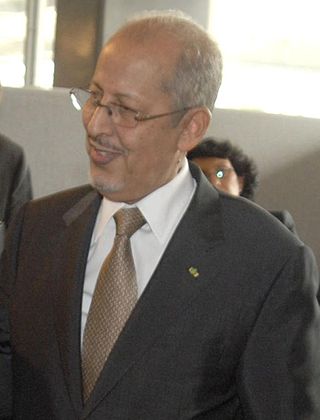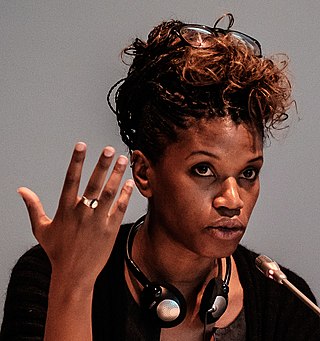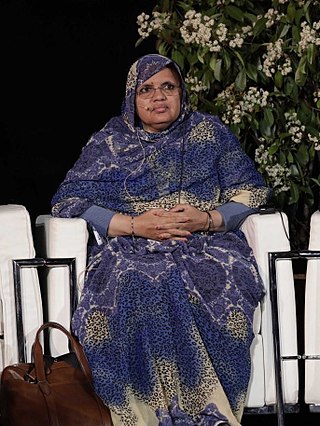Related Research Articles

The economy of Mauritania is still largely based on agriculture, slave labour and livestock, even though most of the nomads and many subsistence farmers were forced into the cities by recurring droughts in the 1970s and 1980s.

Nouakchott is the capital and largest city of Mauritania. Located in the southwestern part of the country, it is one of the largest cities in the Sahara. The city also serves as the administrative and economic center of Mauritania.

Sidi Mohamed Ould Boubacar is a Mauritanian politician who has been Prime Minister of Mauritania twice, from 1992 to 1996 and again from 2005 to 2007.

Messaoud Ould Boulkheir is a political figure from Mauritania and a leader in the Haratine community. Messaoud also contributed towards the end of the 1989 events in Mauritania, protecting the right of the victims and the emancipation of the Haratine in Mauritania with his party.
Cheikh El Avia Ould Mohamed Khouna is a Mauritanian political figure. He was the 7th Prime Minister of Mauritania from January 2, 1996, to December 18, 1997, Minister of Foreign Affairs from July 12, 1998, to November 16, 1998, and Prime Minister again from November 16, 1998, to July 6, 2003, under President Maaouya Ould Sid'Ahmed Taya; later, he briefly served as Minister of Foreign Affairs again in 2008.

Sidi Mohamed Ould Cheikh Abdallahi was a Mauritanian politician who was President of Mauritania from 2007 to 2008. He served in the government during the 1970s, and after a long period of absence from politics he won the March 2007 presidential election, taking office on 19 April 2007. He was deposed in a military coup d'état on 6 August 2008.

The state of human rights in Qatar is a concern for several non-governmental organisations, such as the Human Rights Watch (HRW), which reported in 2012 that hundreds of thousands of mostly South Asian migrant workers in construction in Qatar risk serious exploitation and abuse, sometimes amounting to forced labour. Qatar is an authoritarian and de facto absolute monarchy under the House of Thani. Qatari law also does not permit the establishment of political bodies or trade unions. Awareness of human rights abuses in Qatar grew internationally after Qatar's controversial selection to stage the 2022 FIFA World Cup.

The kafala system or kefala system is a system in the Middle East that involves binding migrant workers to a specific employer throughout the period of their residence in a country. It currently exists in many Arab countries, especially those on the Arabian Peninsula. A similar "binding system" existed in Israel until 2006, when the Israeli Supreme Court addressed and eliminated it.

Naha bint Mouknass is a Mauritanian politician. She was the Minister for Foreign Affairs and Cooperation of Mauritania, serving in this capacity between 2009 and 2011.

Malouma Mint El Meidah, also simply Maalouma or Malouma, is a Mauritanian singer, songwriter and politician. Raised in the south-west of the country by parents versed in traditional Mauritanian music, she first performed when she was twelve, soon featuring in solo concerts. Her first song "Habibi Habeytou" harshly criticized the way in which women were treated by their husbands. Though an immediate success, it caused an outcry from the traditional ruling classes. After being forced into marriage while still a teenager, Malouma had to give up singing until 1986. She developed her own style combining traditional music with blues, jazz, and electro. Appearing on television with songs addressing highly controversial topics such as conjugal life, poverty and inequality, she was censored in Mauritania in the early 1990s but began to perform abroad by the end of the decade. After the ban was finally lifted, she relaunched her singing and recording career, gaining popularity, particularly among the younger generation. Her fourth album, Knou (2014), includes lyrics expressing her views on human rights and women's place in society.

Rama Thiaw is a Senegalese filmmaker and screenwriter. She is known for her 2009 documentary Boul Fallé, la Voie de la lutte and her most recent documentary The Revolution Won’t be Televised (2016).

Fatimata M'baye is a Mauritanian lawyer. She has campaigned for human rights in her country. In 2016, she was given an International Women of Courage Award by the U.S. Secretary of State.
Aïchetou Mint Ahmedou is a Mauritanian writer, working in French.
Mubarkah Bent al-Barra is a Mauritanian poet and translator.
Vatma Vall Mint Soueina is a Mauritanian politician woman who served as Minister of Foreign Affairs in 2015, and as Minister of Livestock from 2015 to 2018.

Fatimatou Mint Abdel Malick is a Mauritanian politician who has served as mayor of Tevragh-Zeina since 2001. She was the first woman in her country to hold the position of mayor. From 2012 to 2015 she served as president of The Network for Locally Elected Women of Africa (REFELA).
The following is a timeline of the history of the city of Nouakchott, Mauritania.
Lalla Mariam Bint Moulaye Idriss is a Mauritanian politician. Born in Ayoun el Atrous, she began her studies in that town before continuing them in Nouakchott, eventually gaining a doctoral degree in financial engineering.

Mokhtar Ould Djay is a Mauritanian politician serving as the prime minister of Mauritania since 2 August 2024. He previously served as Minister of Finance and Minister of Economy and Finance under the presidency of Mohamed Ould Abdel Aziz, and more recently as Head of the Office of President Mohamed Ould Ghazouani.

Mariem Mint Mohamed Fadel Ould Dah, also known as Mariem Mint Dah, is a Mauritanian dentist, commander in the Armed Forces of Mauritania and activist who has been the First Lady of the Islamic Republic of Mauritania since 2019 as the wife of President Mohamed Ould Ghazouani.
References
- 1 2 3 "Maty Mint Hamady". Leaders Afrique (in French). 28 September 2015. Retrieved 2 November 2016.
- 1 2 "Les CV des membres du nouveau gouvernement". BoolumbalOrg (in French). 26 August 2009. Retrieved 2 November 2016.
- ↑ "La commissaire à la promotion des investissements reçoit une délégation d'investisseurs qataris et iranien". Pmd.fr (in French). 4 September 2009. Retrieved 2 November 2016.
- ↑ Oudaa, Marouf (23 August 2011). "Mauritania Increases Minimum Wage by 43% After Talks, AMI Says". Bloomberg.com. Retrieved 2 November 2016.
- 1 2 Naudé, Pierre-François (5 February 2014). "Mauritanie : Maty Mint Hamady, première femme maire de Nouakchott". Jeune Afrique . Retrieved 2 November 2016.